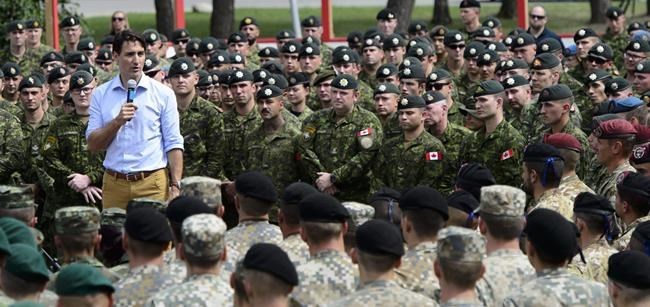OTTAWA — The Canadian Armed Forces is dealing with a COVID-19 outbreak in Latvia, where an unspecified number of troops have tested positive for the illness while guarding against Russian aggression in the region.
The Department of National Defence confirmed on Tuesday that military personnel at Camp Adazi near the Latvian capital of Riga have contracted COVID-19, though it would not provide specific numbers.
“The Canadian Armed Forces have some members deployed on Operation Reassurance in Latvia (who) have tested positive for COVID-19,” Defence Department spokesman Daniel Le Bouthillier said in a statement.
“For operational security reasons, specific numbers of affected members will not be released.”
Canada has 540 soldiers in Latvia, where the Canadian military has been leading a NATO battlegroup that includes troops from nine other countries as a check against Russian incursions into eastern Europe and the Baltics.
Media reports have indicated that troops from some of those other countries have also tested positive for COVID-19, and that NATO and Latvian officials were scrambling to contain the outbreak.
Britain, Germany and the United States are leading similar battlegroups in neighbouring Estonia, Lithuania and Poland, all of which were established after Russia annexed the Crimean Peninsula from Ukraine in 2014.
The Canadian Armed Forces reported Tuesday that 732 military members have tested positive for COVID-19 since the start of the pandemic in March, an increase of 56 since last week.
Thirty-two still had the illness, more than double the 15 that were reported last week.
The current contingent of soldiers in Latvia arrived in July only after their plane turned back in midair because of concerns the troops might have been exposed to COVID-19 before leaving Canada.
While such deployments are often six months long, Le Bouthillier said Ottawa and Riga are in discussions about when the group can return home and be replaced by a new contingent.
He suggested any decision would remain secret due to security concerns, even though such rotations have been publicly revealed in the past.
The infections in Latvia follow an outbreak among Canadian military personnel in Kuwait at the beginning of December. Canada has hundreds of troops in the Middle East participating in the U.S.-led fight against the Islamic State of Iraq and the Levant.
All infected troops in Latvia are in isolation, Le Bouthillier said, while contact-tracing efforts are underway to limit the spread of the disease.
Latvia’s ambassador to Canada would not reveal the extent of the outbreak but said the situation “is and was under control” after his government set up a rapid-testing facility at Camp Adazi and imposed other measures to prevent further infections.
He also downplayed any threat to the integrity and combat capability of the battlegroup.
“The health-protection measures aim to preserve the combat power and readiness of NATO’s (battlegroup) in Latvia, which has not been affected since the pandemic,” Karlis Eihenbaums said in an email to The Canadian Press.
“Soldiers are following Latvian government regulations and the Canadian Armed Forces preventative measures, and also the Camp Adazi restrictions to reduce any potential risks to contract COVID-19.”
Latvia, like many countries, has seen a surge in the number of new COVID-19 cases in recent weeks, with more than 1,800 reported on Dec. 31, the highest daily total so far. More than 500 new infections were reported on Sunday.
This report by The Canadian Press was first published Jan. 5, 2021.
Lee Berthiaume, The Canadian Press



